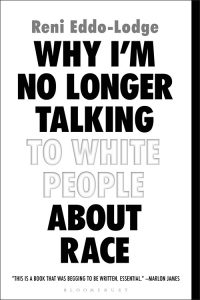We need to describe the invisible monolith
 Why I’m No Longer Talking to White People About Race
Why I’m No Longer Talking to White People About Race
by Reni Eddo-Lodge
My favourite of the anti-racist books I have read so far (though they’re all good), this is an extension of Eddo-Lodge’s 2014 essay of the same title that pushed her to the forefront of British journalists asked to comment on issues around race and racism. Which isn’t quite as ironic as it sounds; the essay was after all a public statement about racism. She was (justifiably) tired of having the same conversations with white people who refuse to acknowledge racism; tired of racism being deemed a problem for black and brown people to solve; tired of racism and talking about it taking up so much of her time and emotions. She was giving herself permission to take a break, walk away, self-preserve.
This book expands on that essay by detailing the many ways in which racism exists in the UK that white people tend not to notice. From police bigotry to the language people use; from the largely erased history of black people in the UK to the systems and processes throughout our society that are racist, Eddo-Lodge lays it bare. She devotes a chapter to untangling arguments that confound race and class in Britain (“It’s really a class problem” is a common defence against the existence of racism here).
“In a world where blunt, obvious acts are just tip of the iceberg of racism, we need to describe the invisible monolith. Now, racism can be found in the way a debate is framed. Now, racism can be found in coded language. Attacking racist frame, form, functions and codes with no words to describe them can make you feel like you are the only one who sees the problem. We need to see racism as structural in order to see its insidiousness.”
I found it surprisingly tough to have it confirmed that campaigning spaces such as feminist groups and environmental groups have a history (and in many cases a present) of being hostile to black members. Eddo-Lodge is a feminist and spent years being attacked and/or ignored by prominent feminists (including some I would have previously said I respect and admire) for raising the point that black women experience misogyny and sexism in different ways from white women – and that feminist causes must acknowledge that or they fail to truly represent women. It appears to me now such an obvious statement that I am baffled by the pushback – but I wonder if me of 10 years ago would have felt the same.
“[Feminism] has failed when it works as an unwittingly exclusive movement that isn’t self-aware enough to recognise where its participants benefit from the current system…Demands for equality need to be as complicated as the inequalities they attempt to address. The question is: who do we want to be equal to? Men, like women, are not homogeneous…It’s clear that equality doesn’t quite cut it. Asking for a sliver of disproportional power is too polite a request. I don’t want to be included. Instead, I want to question who created the standard in the first place.”
Considering how awful so much of the reality is that Eddo-Lodge is bringing to light, she ends on a note of kindness and togetherness. She gives some pointers on how to be anti-racist and gently breaks it to white people that we need to sort this problem out.
This really is the perfect book for right now, so it’s little wonder it’s been selling out everywhere for the past few months. This should not be the entirety of your anti-racism education but it’s an excellent basis to build from.
First published 2017 by Bloomsbury Publishing.
Source: Christmas present from my Dad.